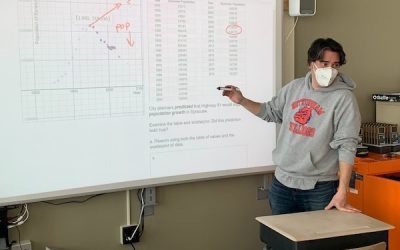Students at the Syracuse City School District learned algebra in meaningful and impactful ways during Black History Month, thanks to a collaboration between Nottingham High School mathematics teachers and Syracuse University School of Education.

High school teachers Ken Keech and Betty Routhouska worked with Nicole Fonger, Assistant Professor of Mathematics and Mathematics Education, to align their lesson preparation with a study of Black history in Syracuse. Together, they developed research-based math lessons that connect math skills and intellect, students’ identities and history, and critical thinking about present day issues—all observed through a mathematical lens.
Keech and Routhouska led the teaching of these lessons to Algebra and Algebra 2A students in February 2022, with support from consultant teachers Nicole Jenkins, Cornelius Vines, and Nicole Mannara.
During the lessons, students examined photographs of Black couples and read interviews of people describing what it was like to live in Syracuse’s 15th ward, once a thriving community and “refuge from discrimination” in the 1940s and 1950s. The ward and its neighborhoods were largely razed by the construction of Interstate Highway 81 in the 1960s.
Students annotated historical maps of Syracuse, watched videos describing the environmental justice issues related to I-81—including the prevalence of asthma—and they engaged with virtual reality simulations showing the past and present of the 15th ward.
These historical events were then analyzed through a mathematical lens. For instance, students learned how to find the equation of a line that was a “good fit” for Syracuse population data over time. They used the line to make predictions about the Syracuse population in the future and reflected on decisions that policymakers made in the past about building I-81.
“This lesson completely amazed me. It used algebra skills while also displaying very important parts of Syracuse’s history.”
In explaining the lesson to one class of algebra students, Keech said, “I want you to be empowered so that when you’re the leaders of this place you can use math to your benefit”. This empowerment resonated with students. “I enjoyed this lesson because I got some history about Syracuse that I can teach others about too,” one student wrote

In other reflections, students noted “how relevant [the lesson] is to our lives currently” and that the lesson plan made it “more comfortable and inclusive to multiple different people from multiple different communities.”
One student wrote, “This lesson completely amazed me. It used algebra skills while also displaying very important parts of Syracuse’s history.” Another shared: “I really liked this lesson because not only was it relatively hard, but I believe modern racism and even past racism in Syracuse isn’t talked about enough. I appreciate getting a window to look at it from a class that isn’t required to sugarcoat it”
“Principal Baxter is clearly dedicated to supporting math teachers at Nottingham High School and to providing the supports necessary for students to relate to math in personal and meaningful ways,” says Professor Fonger. “I’m inspired by how Mr. Keech and Mrs. Routhouska elicited rich discussions with their students. I hope that by sharing this work, other teachers will see the power of integrating local history, current events, and math.”
In this spirit, one student observed, “The rise and fall of any population can be graphed, so why not record the data from where we live while also touching on important issues from present times.”
Professor Nicole Fonger and Daslin Peña ’23 contributed to this story.
Learn more about the Mathematics Education (Grades 7-12), B.A./B.S. and the Mathematics Education (Grades 7-12), M.S.
